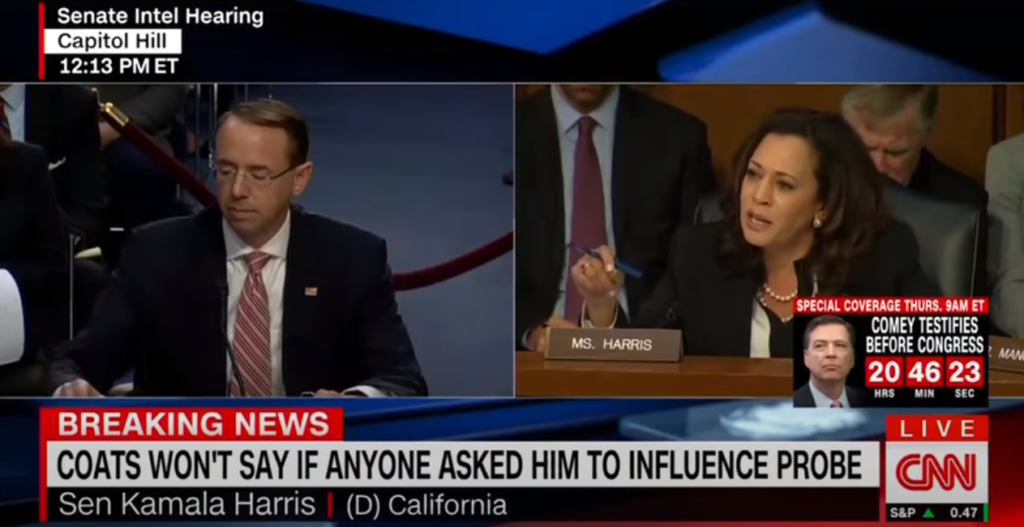I had nearly finished this piece when the pick of Kamala Harris by Joe Biden was announced. My conclusion reflects this development. So, let’s consider this some tough love for Harris, whom I will now support unreservedly and wholeheartedly, who deserves my support, has earned my support, and who should have all of yours.
By Brian E. Frydenborg (LinkedIn, Facebook, Twitter @bfry1981) August 11, 2020 (see related articles: August 20, 2020: I Was Wrong about Harris. Why I Changed My Mind and How She Won Me Over and August 8, 2020: Based on Experience, Susan Rice Is Easily—by Far—the Best Choice for VP for Biden (Sorry Harris Fans, that Includes Kamala))
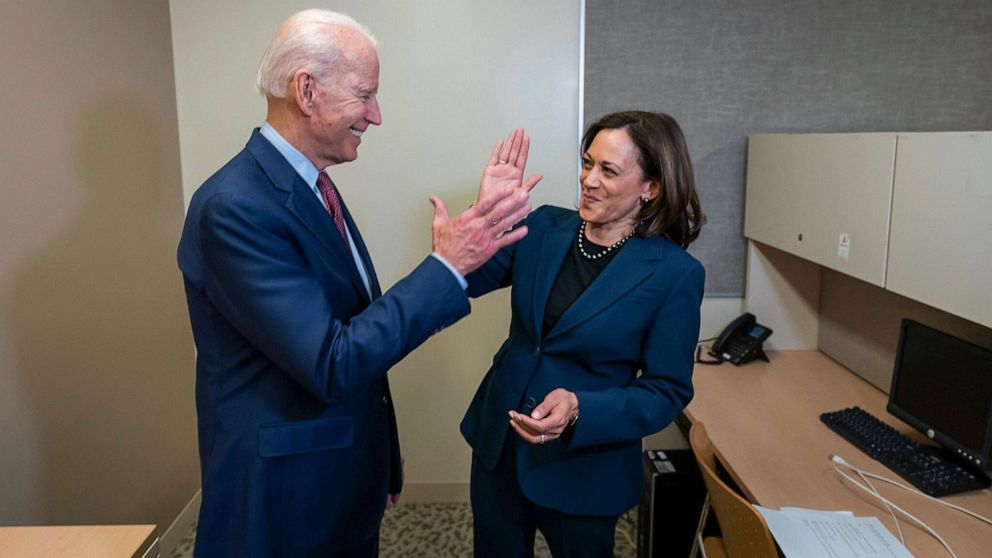
WASHINGTON and SILVER SPRING—In my earlier recent piece comparing the careers of California Senator Kamala Harris and former Obama Administration National Security Advisor and United States Ambassador to the United Nations Susan Rice, I noted that I have been watching and really enjoying ESPN’s The Last Dance (the documentary series about Michael Jordan and his Chicago Bulls’s championship teams, especially their final championship run). I noted that there are two main facets as to how a player gets selected for a team and how they perform: the first facet is the stats: the numbers that would be a on a player’s trading card; that is what I looked at in that last piece as far as Harris and Rice. In this piece, I want to look at some of the intangibles, the second facet: the stuff that you would not get by looking at a trading card, but which speak more to personality and traits that are more about how you operate or fit on a team in ways that numbers cannot display. And a lot of these intangibles can come across in informed first impressions voters get from seeing each for the first time.
First Impressions
I will begin first by just explaining how I remember being introduced and familiar with both Rice and Harris.
Rice
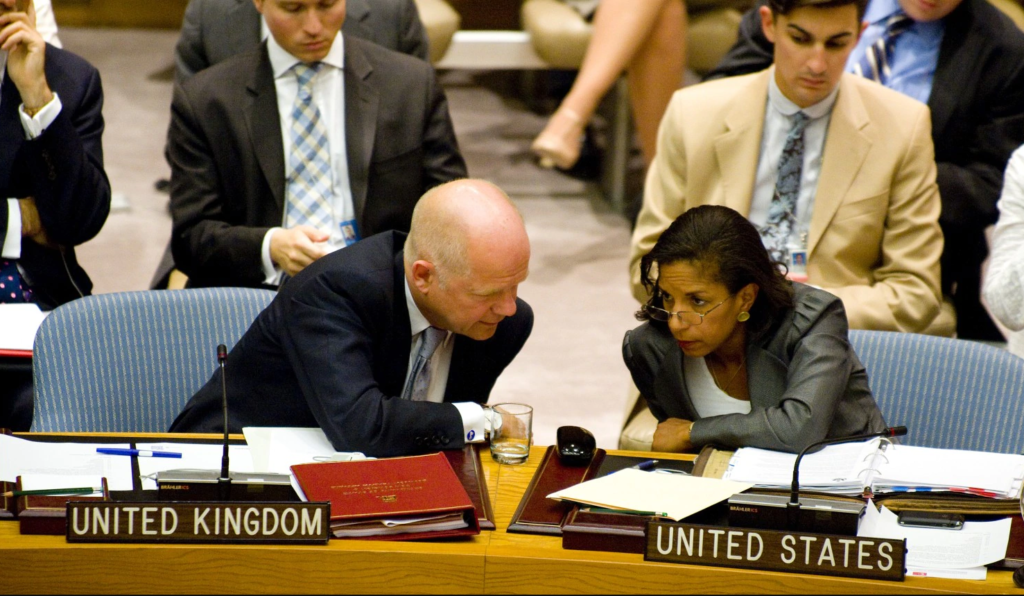
With Rice, I do not really remember anything specific. I did not watch or read a lot of news in the 1990s in middle school or high school. I was super busy in both: lots of activities (music, sports) and taking advanced classes throughout. I also went to a fairly strict boarding school for high school (shout out to Canterbury), where TV-watching was quite limited (and when we had freedom to watch TV in the common room, it was usually sports and MTV that the other kids had on; I never, ever recall seeing the news on in the dorms. If I had put the news on, I probably would have been physically driven out of the dorms) and where I was busy enough that I did not get to read the news too often, either.
I still followed politics a bit somehow in high school, but I can say that I have no recollection that I ever heard of or even saw Susan Rice when she was with the Clinton Administration or in the time that followed before she was with the Obama campaign. I do not have any recollection of becoming aware of her existence during the 2008 election either, though perhaps I saw her on TV or read an article or few that mentioned her. I do know that I became aware of her as our Ambassador to the United Nations. I recall nothing specific between the first term and the Benghazi “scandal,” other than a few times she would have been speaking about the Israeli-Palestinian conflict at the UN and I am sure I saw her other times in clips of other UN deliberations as well as press conferences, interviews, and in articles. Each time, I remember seeing her calm, composed, knowledgeable, competent, sharp, and articulate, a solid representation of America to the world and a competent National Security Advisor, one of the only black women in American history to reach such heights in government and on the world stage representing America. Until recently, I only had a vague—I had never digested her in depth or at length—but strongly positive impression of her, with no complaints that I can recollect; this was, in part, because I researched the Benghazi situation deeply in advance of Clinton’s marathon Congressional testimony of October, 2015, and realized that entire case against Hillary Clinton (and, by default, Susan Rice) in terms of the Benghazi fiasco, was, as I noted at the time, a cynical, disgusting, disingenuous, dishonest, witch hunt-like, purely political attempt to damage Hillary Clinton and the Obama Administration before the 2016 election (check out my in-depth article examining this hearing for a dismantling of all the specious, misleading, and/or untruthful arguments put out by Republicans). The first experience I ever had that really focused on Rice was watching while working out in the fall of 2019 an interview of her by Walter Isaacson for Amanpour and Company on the event of the release of her memoir. I was incredibly impressed with her, and have since paid more attention to her and her interviews and tweets since her book tour started, and her public interactions have consistently been at a level that keeps impressing me at a very high level.
Harris
When it came to Harris, my introduction to her was very much at a time when I was glued into politics as a freelance reporter who was then focusing much more on American politics than I had previously, and, she was also being built up as a star; for these reasons, I ended up paying way more attention to her when I first came across her than I did with Rice. I was still living in the Middle East, but had found, most disappointingly and quite sadly, that Trump and the U.S. election cycle giving me much more opportunity and paid way better than covering Syrian refugees, ISIS, Iraq, or the Israeli-Palestinian conflict. I had been closely following the whole Trump-Russia saga, in particular, since July, 2016. Thus, when there was a highly-anticipated hearing of the Senate Intelligence Committee with key figures from the intelligence and law enforcement community, including Deputy Attorney General Rod Rosenstein, who had only weeks earlier appointed former FBI Director Robert Mueller as Special Counsel to investigate Trump’s ties to Russia, Russian election interference, and any possible collusion between people around Trump with the Russian government or its intermediaries, I was highly interested.
One of the Democratic senators taking part in the hearing was the newly-elected Kamala Harris from California. Her win in 2016 was certainly met with some excitement, the second black woman to be elected to the U.S. Senate and the first South-Asian (her father was black and her mother was Indian).
Full disclosure: I grew up near New York, and we East Coasters pay little attention to California politics. So, I barely paid attention to her in the 2016 campaign, which was an extremely busy time for me when I was trying to cover the primaries and Clinton vs. Trump. Thus, I was pretty excited about this hearing: in many ways, it would be Harris’s biggest stage yet, her introduction to the national scene, and it was certainly her introduction to me. I remember hearing a lot of hype about how she could be the next Obama, presidential material, and the future of the party, so I was expecting to be mightily impressed and looking forward to seeing one of our brightest new stars of my left on the national stage in action.
Now, full disclosure: before you read my take on what transpired, you should know I watched the entire hearing live and closely (full video and transcript). I was deeply interested in all the proceedings and was at least somewhat, sometimes very, familiar with the issues being discussed. And I have to say that from the very beginning of her allotted time (video beginning with that here) during the hearing, I was shocked at how obnoxious, grating, and disappointing I found her performance to be. From the very beginning, she was rude and grandstandy, first very briefly to Admiral Mike Rogers, cutting him off after asking him a question so that he asked, respectfully, “Senator, if you could, could I get to respond, please, ma’am?” He then tried to continue but she interrupted him again. “No, sir. No, no.”
It looked like Harris was going to act like a Big Name prosecutor taking on a Hostile Witness, and almost immediately, she switched to question Rosenstein with the bulk of her time, confirming this impression with him, too. She constantly interrupted him and cut him off, was rude and hostile, not yelling and haranguing like maniac and staunch Trump apparatchik Jim Jordan might in the House, not even raising her voice to the less-annoying-than-Jim Jordan-level of Republican Ted Cruz in the saucer-cooling Senate, but still clearly determined to stand out, show that she was being “tough,” demonstrate her stern courtroom prosecutorial demeanor, and make a name for herself with a figure like Rosenstein very much in the headlines. And her whole premise was to act like she was leading an effort to protect Mueller from Trump Administration interference or from even being sacked to protect the president, citing a precedent where a previous Attorney General (AG) overseeing an independent, specially-appointed inquiry had pledged in writing to respect the independence of the investigation. But in that case, the appointed head of the inquiry was a sitting U.S. Attorney that could be fired by the president, so there was a potential conflict in that he normally reported as a Department of Justice employee to the AG and served at the pleasure of the president. In this case, Mueller was a retired and private citizen who was not part of the Department of Justice and did not have that conflict or reporting issues and could not be fired by the president and under law could only be fired under special, non-political, non-arbitrary circumstances by the top Department of Justice official overseeing the investigation (Rosenstein, because AG Jeff Sessions had recused himself). Between that and the regulations of the particular law governing Mueller’s appointment—regulations that that did not apply to the precedent Harris was citing—Harris’s point was moot and so were her attempts to get Rosenstein, in a quite a badgering (do not worry, I apply that term often for male congressman) and hostile manner, to commit to a statement in writing like the one she cited earlier but that did not apply under circumstances that were quite different in relation to Harris’s line of questioning.
Rosenstein was very respectfully trying to explain this to Harris, but Harris repeatedly cut him off and continued to demand a simple answer to a complex question. Sen. John McCain, who stood up more to Trump and Republican malfeasance and better than any other Republican senator during the Trump Administration, came to the rescue of Rosenstein, asking for Harris to stop interrupting the witness and to let him answer the question. The Republican Chairman of the Committee, Senator Richard Burr, would join in, stopping Harris after she challenged even Burr him from repeating the same question in a hostile manner and permitting Rosenstein to make the above explanation about why a simple “yes” or “no” did not as answer given the different circumstances.
And by hostile, I mean hostile; again, I watched the entire over two-and-a-half-hours-long hearing, and nobody else acted in any way near the manner of Harris. Only her’; everyone else—Democrat and Republican alike—was polite to the witnesses, did not repeatedly cut them off, used a respectful, non-badgering tone, and did not feel the need to be adversarial even though they found a great many things to be frustrating and concerning, but Harris adopted this adversarial tone from her very first question to the admiral and continued using it until her time was up.
There are two other reasons why this is incredibly obnoxious: despite pressure from the president to stop Mueller, Rosenstein had defended Mueller’s probe (it was Rosenstein who became alarmed enough at Trump’s behavior that he was the one who decided to appoint a special counsel to investigate Trump, and it was also Rosenstein he who chose Mueller) and had given Mueller a lot of freedom, independence, and support. Rosenstein is far from perfect and has had some problematic aspects of his time as Deputy AG ands since, but at this point he has been very much on the right side by deciding to appoint a special counsel, Mueller, and working to keep the integrity of Mueller’s investigation secure amidst considerable pressure to compromise it by Trump, Republicans, and right-wing media. The other reason this is incredibly obnoxious is that I am certain Kamala Harris knew the law (she is an accomplished prosecutor and served as California’s Attorney General) and knew that her point was largely moot, not appropriate, and not fair to Rosenstein. But she was determined to establish herself as a tough newcomer, to get attention, to rise above all her peers during her first major public hearing. She was trying to trap both the admiral and especially Rosenstein into “gotchya” questions, embarrassing them and pushing them into a seemingly hypocritical trap to make the witness look like he hiding something unnecessarily in the case of the admiral and that he was not willing to stand up for the independence and integrity of the Mueller probe in the case of Rosenstein (which by all accounts up to that point and many beyond, he had). So Harris knew she did not need to be overly concerned over Rosenstein at that point; she knew her clever attempt to prosecutorally box Rosenstein in like he was a defendant on the witness stand back in California was not getting at the heart of any major issues with the Mueller probe, knew that her actions were designed to generate a soundbite that would hopefully go viral, and knew she was engaging in self-promotion that was a subtle attack on the integrity of both Rosenstein and Admiral Rogers over a moot point, designed to make her look like she was a tough prosecutor who was taking a version of Law and Order to Washington. In an otherwise cordial hearing, her contentious exchanges would stand out and get her attention in a situation where most junior senators would not behave this way. You could smell presidential aspirations on her from a mile away. And if you think I am making this up, this is exactly how Maya Rudolph satirized Harris on Saturday Night Live: always looking to create a media moment that would go viral on the internet, designed to get her attention and often show her as a tough ready-for-primetime prosecutor, regardless of the level of substance behind what she was saying.
Yep, that was my introduction to Harris: a woman clearly of great intellect, substance, and capability that chose to engage in grandstanding devoid of substance, misleading but guaranteed to get headlines.
I was deeply saddened; is this what the internet was doing to us, hollowing out our politics to be mostly hot air? Was Harris going to use her office to be an effective legislator or focus on promoting herself in the media and on using her office to prepare a presidential run? Would we be elevating the likes of Bernie Sanders whose “plans” were never in the realm of reality and whose central narratives and premises justifying his campaign were crafted on fantasy, thus pretty much dooming his campaign? Were capable women of substance going to choose to play for meme and viral moments, hoping to base their campaigns on social media likes and shares? Were these folks really going to be the future of the Party?
But the next day, it would get even worse, as Harris tried to capitalize on her events from the day before in an even more blatantly cynical attempt to create a viral, slogan-ready moment. Because she had been interrupted by McCain and Burr—two men, two white men—there was an opportunity to frame their actions as sexist or even racist. One thing is for certain: Warren’s viral “Nevertheless, she persisted” moment form just a few months earlier—when Republican male Senate colleagues had silenced Warren with a rarely used technicality regarding actions that “impute” fellow senators directly—was very much on Harris’s mind, and she clearly wanted to recreate that, especially the vibe of a woman standing up to powerful men. It was almost like she could see Warren (whom I have been fairly critical of for various reasons) getting an edge over here for 2020 and she wanted to respond, and while Warren’s moment seemed relatively authentic, this would have a feel of being manufactured. Harris’s plan was already implemented within two days of the hearing, with Harris was advertising stickers on Facebook with the words “courage not courtesy” you could get on her website—not on her Senate site, but kamalaharris.org (translation: she’s running. Already. In June, 2017).

Now, first off, there is a tremendous amount of sexism in the world, in America, in politics, in the Senate. Of that, there is no doubt among rational, informed people. And to be fair to Harris, it was smart politics. Gimmicky as hell? Cringingly forced and inauthentic? Sure. But definitely effective: most voters would not have watched the hearing. Some—many—will have seen the clips of Harris and taken the image of her she wanted them to; most certainly would not have known much about Rosenstein or the special counsel regulations, and she was betting on that. She had created her viral moment, though it would pale in impact and reach to Warren’s, and, I suspect, fell far short of what she was hoping, but it certainly got the attention of the media, some outlets of which tried to make it a sequel to Warren’s big moment.
I have watched Harris plenty of times since then, and, at least until the 2020 campaign—another story possibly for another time—most of her performances were much better that what I saw at the Senate Intelligence Committee hearing. I would be wrong if I did not admit that this first major impression she made was strong, and that it made me more likely to read calculated political gamesmanship into some of her actions—I would say fairly—but that did not stop me from seeing her as capable, formidable, one of the top rising stars on the left, and a top-tier contender for the 2020 nomination, one of the few I thought that could compete with Biden if he was to run.
Yet still, once of the reasons I love Biden is his authenticity and positioning of substance front and center throughout his career. As for “courage not courtesy,” just ugh. I have written about the devolution of our politics for years and it has been happening for years, but once thing that was fairly consistent for some time was that, unlike the more unruly House, the Senate was supposed to be an elevated form of politics less prone to theatrics, more prone to comity, civility, cooperation, and compromise, with less heated rhetoric and more substantive deliberations, more removed from the passions and the whims of the masses. There is an old, unsubstantiated tradition that Washington told Jefferson that the Senate was like a “saucer” that could allow “our legislation to cool.” In the words of James Madison in Federalist “No. 62,” the Senate would be less “subject to the infection of violent passions, or to the danger of combining in pursuit of unjust measures” than the House. But these days, this distinction is decidedly weakened and weakening, and I am not for that. Today is all about “populists” on both sides smashing tradition and norms and going around institutions and political colleagues “directly to the people,” whatever that means. Think Bernie Sanders’s mobilizing millions of people to take to the streets as a governing philosophy. Far worse, think about Trump’s calls on his supporters to take to the streets if things do not go well for him. Harris’s theatrics were by far nowhere near the worst I have seen in the Senate, not even close to second worst (Hello, Ted Cruz and Tom Cotton!), but they were another step in a decline that seriously worried me. And Harris, clearly, cared little for such tradition if she felt she could blaze a trail for her advancement.
A reasonable case can be made that this is what is needed at this time, that Harris’s calculation is what is needed against the Republican and Trumpian threat. I thought to myself, Harris might have what it takes to win in the Internet/Twitter age, perhaps even what is needed to take on Trump, and she would have my support against him, but I do not have to like it. I do not have to like how she treated DAG Rosenstein and Admiral Rogers. I not have to like the premeditation to stand out tonally in a setting when it just was not at all necessary. I do not have to like the calculated attempt to prepare sloganeering stickers within days.
But that does not mean I can not like or support Harris.
Rooting for (vice presidential nominee) Harris’s Best Self
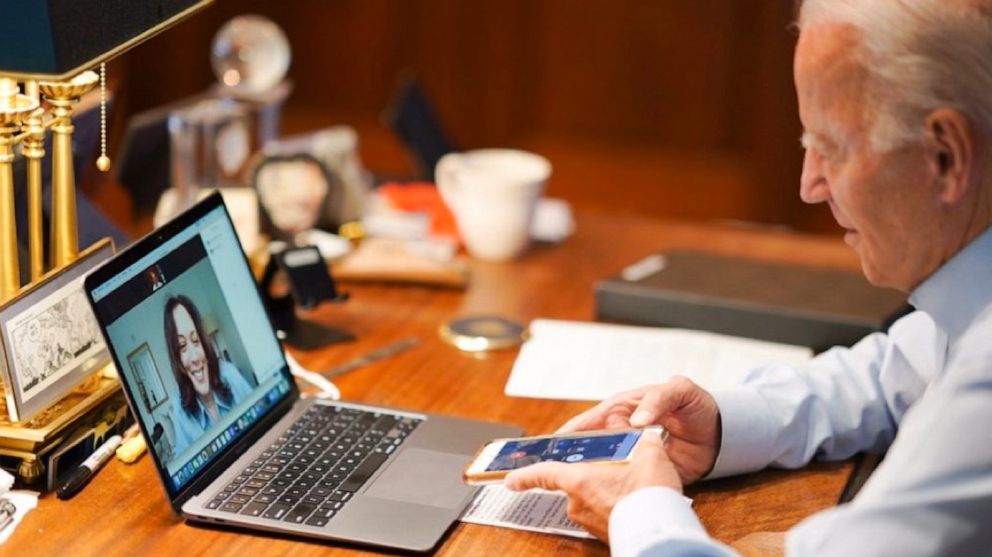
As I write this conclusion, news is breaking that Biden has picked Harris. My preference would definitely have been for Susan Rice. But I point out these issues I have with Harris (before or after her being picked) not to denigrate her, not to turn people against her. Harris if anything responds to the atmosphere in the moment. She could very likely be our next vice president. She would have my support as VP and should have all our support, has mine as a candidate for VP, and deserves our respect for earning this pick on the part of Biden.
To an extent, some of the concerns I have about Harris are mollified by Biden’s confidence in her in selecting her. At the same time, I am still publishing this not just because I had written most of it before the pick was announced, but because I hope these concerns I have will be shared by others in a way where we push Harris to be her best self, not the disappointing campaigner we saw in 2019 and much better than the performance I saw in the hearing from 2017 I discussed above.
I have 100% confidence that Harris is more than capable of taking the higher road. Even though I argued recently that Rice had better experience to be a VP, Harris’s experience is still impressive and contains much substance, much to be proud of, and she is both a safer and probably a better bet politically. It is a sad testament to our current politics that a woman of color so accomplished and so talented would feel the need to play to internet/meme culture so strongly, though Peter Beinart makes a good case defending her in The Atlantic that, like Obama, as a black trailblazer in politics she has had to play it safer, in that article’s case, with her actions on criminal justice in California, actions which have been heavily criticized. I hope, now that she has bested all but one man to be the second survivor of the Democratic primaries, that she will feel less pressure, feel more freedom, and feel confident enough in her selection by Biden to run more on substance and less on style and seeking viral moments (not that those do not help, but that is my preference as one of her supporters and one who wants to see our politics reelevated). I hope that, if Biden wins, she can learn from someone like Susan Rice on foreign and security policy, follow Biden’s lead, be a great governing partner, and set herself up to be an amazing president of her own years down the road.
And that is in part up to us: it is no longer the Democratic primaries, and a much more moderate, national crowd is her audience; as her supporters or on-the-fence-voters, it is, in part, up to us to telegraph what we want from her, so lets us demand her very best, not clamor for internet gimmicks and viral videos. I know that my complaints here were mostly about her style and how she operated, but these “little” things, the way you pursue your goals, the norms you respect and those you break, the tenor and tone you set, set all matter… just look at Trump!
Even as I am writing this conclusion, my emotions changed a bit. Even as someone who was rooting for Susan Rice, I am happy and pleased with Harris (whom I saw as a much better-qualified candidate than Warren, both for president and vice president), and I am genuinely proud of Harris and of her selection by my candidate Joe Biden and my Democratic Party, the historic first woman of color on a major party ticket. It is sad because of our insane coronavirus pandemic response that we cannot have a live event with a huge crowd welcoming Kamala Harris on stage with Joe Biden: both deserved that, especially Harris. But that lost moment is the least of the slights and challenges Harris will face going forward. I am now rooting for Harris, and confident she can help Biden win and govern. She is immeasurably better than Vice President Pence and even more so (obviously) than President Donald Trump.
The pressure is on, but I hope and am confident that Senator Kamala Harris will rise to the occasion. We, the people behind her, can help by pushing to keep substance front and center in a campaign that will contain a historic amount of nonsense from Trump, Republicans, the right-wing media, and the Russians. But together and, yes, with Kamala Harris’s help, we can ensure that President Joe Biden and Vice President Kamala Harris are sworn in on January 20th, 2021.
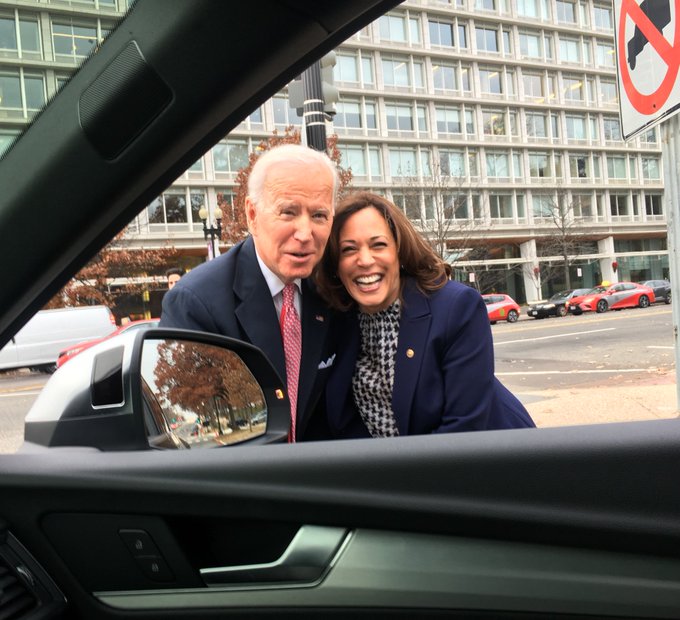
See related previous article: Based on Experience, Susan Rice Is Easily—by Far—the Best Choice for VP for Biden (Sorry Harris Fans, that Includes Kamala)
© 2020 Brian E. Frydenborg all rights reserved, permission required for republication, attributed quotations welcome
Also see Brian’s latest eBook,Coronavirus the Revealer: How the Coronavirus Pandemic Exposes America As Unprepared for Biowarfare & Bioterrorism, Highlighting Traditional U.S. Weakness in Unconventional, Asymmetric Warfare, available in Amazon Kindle, Barnes & Noble Nook, and EPUB editions.
If you appreciate Brian’s unique content, you can support him and his work by donating here and, of course, please share the hell out of this article!!
Feel free to share and repost this article on LinkedIn, Facebook, and Twitter. If you think your site or another would be a good place for this or would like to have Brian generate content for you, your site, or your organization, please do not hesitate to reach out to him!
